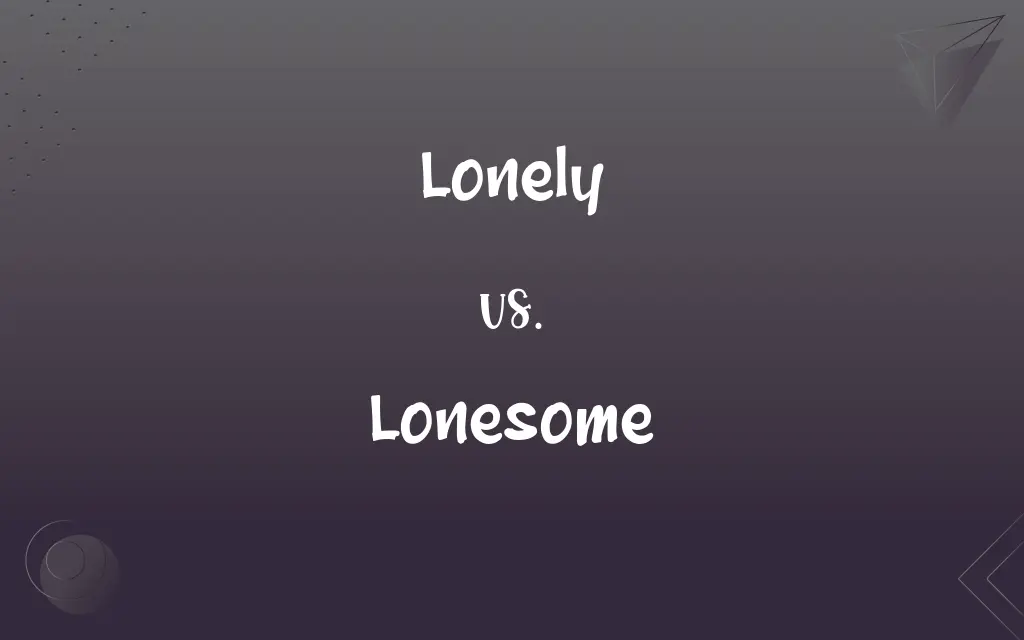Lonely vs. Lonesome: What's the Difference?
Edited by Aimie Carlson || By Harlon Moss || Published on January 22, 2024
"Lonely describes a feeling of sadness due to lack of company, while lonesome emphasizes a state of being solitary or deserted, often with an emotional undertone of longing for companionship."

Key Differences
Lonely is a term that describes a subjective feeling of isolation, often accompanied by sadness or longing for companionship. It can occur even in the presence of others. For example, one can feel lonely in a crowd. Lonesome, on the other hand, typically emphasizes the state of being alone or deserted, and it often carries a more poignant, sometimes romanticized, sense of solitude. For instance, a lonesome road suggests a path that is deserted and quiet.
The word lonely often conveys a deeper, more personal sense of emotional isolation. It can be used to describe the inner feelings of an individual, such as feeling lonely after a breakup. Lonesome tends to describe a more general state of being alone, often used to describe places or situations rather than the deep emotional state of a person. A lonesome landscape, for instance, conveys a sense of emptiness and isolation.
Lonely can be experienced in different scenarios, not just when physically alone. It’s possible to feel lonely in social settings if one feels disconnected or misunderstood. This aspect of loneliness highlights its psychological nature. Lonesome is often used in literature and music to evoke a sense of melancholic solitude, frequently associated with physical solitude, like a lonesome traveler on a journey.
In usage, lonely often carries a more negative connotation, implying a lack of desired companionship and a longing for more social interaction. It’s a word that resonates with the emotional state of missing others. Lonesome, while it can also express sadness, often has a more poetic or romanticized tone, suggesting a serene, reflective form of solitude, like enjoying a lonesome walk on the beach.
The concept of lonely extends beyond physical solitude to include emotional and psychological aspects. It can relate to feelings of disconnection or alienation in various aspects of life. In contrast, lonesome often refers to the physical aspect of being alone, and while it can include emotional elements, it tends to focus more on the actual state of solitude or a quiet, undisturbed environment.
ADVERTISEMENT
Comparison Chart
Emotional Connotation
Sadness from lack of companionship
Poignant solitude, often less intense
Usage Context
Describes feelings, often in social contexts
Describes states or places, emphasizes solitude
Tone
More negative, associated with longing
Often romanticized or reflective
Psychological Aspect
Focuses on emotional isolation
Less focus on deep emotional states
Physical Aspect
Not limited to physical solitude
Often associated with physical solitude
ADVERTISEMENT
Lonely and Lonesome Definitions
Lonely
Characterized by a feeling of solitude or being alone.
Nights are the loneliest times for him.
Lonesome
Feeling sad due to being alone or deserted.
He felt lonesome without his dog by his side.
Lonely
Isolated from others, especially leading to feelings of sadness.
The astronaut described the lonely experience of space.
Lonesome
Describing a place or situation that is quiet and solitary.
She enjoyed her lonesome walks along the beach.
Lonely
Feeling sad because of a lack of friends or company.
She felt lonely in the new city, missing her family and friends.
Lonesome
Inducing a feeling of solitude or melancholy.
The lonesome howl of the wolf echoed in the night.
Lonely
Devoid of companionship or support.
After the party, she returned to her lonely apartment.
Lonesome
Being solitary or remote from others.
The lonesome cabin in the woods was her retreat.
Lonely
Feeling a sense of emptiness from being alone.
Despite the crowd, he felt lonely at heart.
Lonesome
Characterizing a sense of forlornness due to isolation.
The traveler's journey was a long and lonesome one.
Lonely
Dejected by the awareness of being alone.
Lonesome
Dejected because of a lack of companionship.
FAQs
Is lonely always a negative feeling?
Yes, lonely typically implies a negative state of feeling isolated.
Is it possible to feel lonely even when with others?
Yes, one can feel lonely even in social situations if they feel disconnected.
Can someone be lonesome in a crowd?
Lonesome generally refers to physical solitude, so it's less common in a crowd.
Can lonesome have positive connotations?
Yes, lonesome can sometimes imply a peaceful, reflective solitude.
Is lonesome used more in certain genres?
Yes, lonesome is often used in genres like country music or romantic literature.
Can lonely be used to describe places?
Yes, but it usually implies an emotional response to the place.
Can animals feel lonely?
Yes, animals can feel lonely, exhibiting signs of distress when isolated.
Do poets use lonesome to evoke specific imagery?
Yes, poets often use lonesome to evoke imagery of solitude or melancholy.
Does lonely affect mental health?
Yes, prolonged feelings of loneliness can negatively impact mental health.
Does the meaning of lonesome vary in different cultures?
Cultural contexts can influence how lonesome is perceived and experienced.
Does lonely imply a deeper emotion than lonesome?
Yes, lonely often conveys a deeper, more personal emotional state.
Is lonesome often associated with nature?
Yes, lonesome is frequently used to describe natural, solitary settings.
Is lonesome a common feeling for travelers?
Yes, travelers often experience lonesome feelings in unfamiliar places.
Can lonesome feelings inspire creativity?
Yes, feelings of lonesomeness can inspire creative expression in some individuals.
Can technology reduce loneliness?
Technology can help connect people, potentially reducing feelings of loneliness.
Is loneliness a common theme in literature?
Yes, loneliness is a prevalent theme explored in many literary works.
Can lonesome be a choice?
Yes, some people choose lonesome situations for solitude or reflection.
Do social media platforms impact loneliness?
Social media can impact loneliness, both positively and negatively.
Can art and music express lonesomeness?
Yes, art and music are powerful mediums for expressing lonesomeness.
Are children susceptible to feeling lonely?
Yes, children can feel lonely, especially if they struggle with social connections.
About Author
Written by
Harlon MossHarlon is a seasoned quality moderator and accomplished content writer for Difference Wiki. An alumnus of the prestigious University of California, he earned his degree in Computer Science. Leveraging his academic background, Harlon brings a meticulous and informed perspective to his work, ensuring content accuracy and excellence.
Edited by
Aimie CarlsonAimie Carlson, holding a master's degree in English literature, is a fervent English language enthusiast. She lends her writing talents to Difference Wiki, a prominent website that specializes in comparisons, offering readers insightful analyses that both captivate and inform.






































































